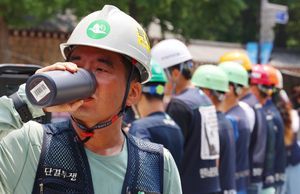 South Korea is bracing for one of the most intense summer heat waves in recorded history, with meteorologists cautioning that temperatures could soar above 40 degrees Celsius (104 degrees Fahrenheit).
South Korea is bracing for one of the most intense summer heat waves in recorded history, with meteorologists cautioning that temperatures could soar above 40 degrees Celsius (104 degrees Fahrenheit).
Heat wave advisories were escalated to warnings across most of the country on Monday morning. By Tuesday, Seoul had recorded a scorching 37.1°C (98.8°F), the highest July temperature since national record-keeping began in 1908.
In South Korea, the Korea Meteorological Administration (KMA) issues heat wave warnings when the highest apparent temperature is expected to exceed 35°C (95°F) for two or more consecutive days.
While Tuesday and Wednesday were predicted to be among the hottest summer days in recent weeks, such extreme temperatures are becoming increasingly common.
A monthly climate report released by the KMA on July 3 revealed that nationwide average temperatures in June reached a sweltering 22.9°C (73.2°F) — the highest since national records began in 1973. This surpassed the previous record of 22.7°C (72.9°F) set just last year.
“South Korea is experiencing heat waves much earlier than usual this year,” KMA official Woo Jin-kyu told The Korea Herald. “Southwesterly winds are bringing warm air to the peninsula. These winds, driven by a high-pressure system, are continuously pushing in hot and humid air, resulting in widespread, prolonged heat waves and tropical nights.”
Woo noted that this year’s monsoon season has been “unusually dry.”
“The monsoon season arrived earlier than usual and is also expected to end much earlier than in previous years,” Woo explained. The KMA announced that the monsoon season officially concluded on July 3, marking the second shortest duration on record. “This year’s rain was largely ineffective in lowering average temperatures. After initial downpours, the rest of the season remained dry with only light showers.”
Meteorologists warn that the shortened monsoon season could lead to even longer and more intense heat waves than last summer. They’ve noted that the timeline for extreme heat appears to have shifted forward by a month.
Meteorologist Gong Sang-min told The Korea Herald, “The weather patterns we’re seeing now are strikingly similar to those observed in 2018, which was one of the hottest summers on record. That year, Korea also experienced an early end to the monsoon season, followed by unprecedented heat.”
In 2018, temperatures in Hongcheon, Gangwon Province, peaked at a blistering 41°C (105.8°F), while Seoul recorded temperatures up to 39.6°C (103.3°F). The national average number of heat wave days that year totaled 31, a record that still stands.
“With high-temperature records already falling, we can’t rule out the possibility of temperatures exceeding 40°C (104°F) again,” Gong cautioned. “The early conclusion of the monsoon season only increases the likelihood of prolonged summer heat.”










Most Commented